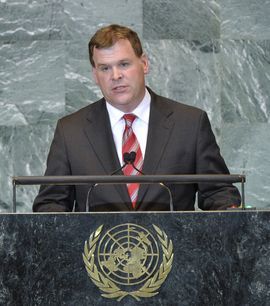 Everything you need to know about today’s media coverage of Israel and the Mideast.
Everything you need to know about today’s media coverage of Israel and the Mideast.
Will Big Media take any interest in legal rulings chipping away at the myth of Mohammed al-Dura? Is the “Start Up Nation” phenomenon rubbing off on Palestinians? And who is really responsible for Gaza’s continuing fuel crisis?
Join the Media Cheat Sheet Page on Facebook.
Israel and the Palestinians
• Following a French court’s acquittal of Dr. Yehuda David, YNet looks at some of the other legal cases stemming from the al-Dura video.
This is not the only slander trial surrounding the al-Dura case. A series of trials revealed an abundance of contradicting testimonies, and evidence trying to ascertain whether al-Dura was killed by IDF fire or Hamas cross fire. However, rulings are always limited to the question of slander, leaving the mystery of al-Dura open for debate.
See also Lilac Sigan‘s must-read reaction asking, Where’s the media?
I don’t blame the boy’s father for lying, by the way. If it were me that had to choose between lying, or telling the truth and being attacked with axes and knives by terrorists again, I’m pretty sure I’d do the same. But while the poor father’s motive for lying is clear — what’s the motive of the western world to keep silent about the truth, and prefer to keep believing the myth?
Sadly, these are the rules of our allegedly truthful world. The myth was aired all over the world and burned into the collective memory. It will live forever, and who knows how many others will be “inspired” with hatred as a result. And what about the real story? For some crazy reason — no one is interested in reporting it. None of the major news channels that reported the incident 12 years ago felt necessary to report the ruling of the French supreme court. I guess it will remain our little secret, then. It kind of makes you wonder — maybe all we really want is a good story with a hero? And once we get it — please, don’t confuse us with the facts.

• Dan Margalit comments on Khader Adnan’s hunger strike. The Islamic Jihad member’s stunt is now at day 65.
Ashton and others like her, here and around the world, have demanded that Israel minimize its use of administrative detention. One can understand where she is coming from, and this should be Israel’s objective too. But we must beware of the Islamic Jihad prisoner’s objective: He is trying to force Israel to refrain from one of the integral and essential aspects of the war against terror. If he wins, there will be no more administrative arrests . . .
Israel should make it very clear to the world that three principles will guide its approach toward Adnan and others like him: Israel will use administrative detention as infrequently as it possibly can; it will fight attempts to force it to abandon a key aspect of the war on terror, despite efforts by Adnan, his father and a handful of journalists to undermine the country’s security; and at the same time, Israel will forcibly prevent Adnan from dying.

• Gaza’s fuel crisis ain’t over yet. Maan News says Egyptian fuel deliveries hit a snag you could’ve seen coming:
Egypt wants to stop the passage of fuel through tunnels under the border between the countries, but the official Rafah terminal is not equipped for goods transfers and its development is restricted by an agreement between Egypt, Israel and the West Bank-based Palestinian Authority.
The only alternative route while this agreement is being renegotiated is for the fuel to cross into Israel, and then back into the Gaza Strip . . .
Unfortunately for the people of Gaza, this Haaretz update says Hamas and the PA are balking at the latter option.
 • Newsweek calls Beitar Jerusalem onto the carpet over the soccer team’s lack of Arab players:
• Newsweek calls Beitar Jerusalem onto the carpet over the soccer team’s lack of Arab players:
“It’s hard to explain the policy as anything but racism,” says Yoav Borowitz, an Israeli journalist who writes regularly about football.
Supporters of the team have a more nuanced explanation. They say the ban is bound up with Beitar’s history and with tensions in Jerusalem, a city where Arabs and Jews live mostly in their own segregated neighborhoods (Israeli Arabs make up 20 percent of Israel’s population) . . .
But people who know Beitar from the inside say the managers fear that any change would prompt a backlash among fans. “Even if the racists are a small minority, they would cause a lot of trouble in the stands if the team suddenly put an Arab on the field,” said one person affiliated with the team who did not want to be identified.
• Is the “Start Up Nation” phenomenon rubbing off on the Palestinians? According to the Christian Science Monitor, West Bank entrepreneurial geeks are hip:
Until now, the primary Palestinian contribution to technology has been outsourcing programmers and engineers to firms in the United States and Israel, including Google and Cisco Systems.
But these new entrepreneurs want to do more. They want to create companies based on their own ideas and hire people to implement them. Already their ventures range from smart phone apps to Web design.
Crucially, the community is now beginning to attract investors.
• Haaretz: Bibi’s peace proposals at January’s Amman talks are remarkably similar to Kadima’s plan.

• Canadian Foreign Minister John Baird is tougher on the Palestinians than his speechwriters. Now you know:
Mr. Baird ended up delivering a much tougher address than envisioned by his speech writers, one that unequivocally emphasized Canada’s support for Israel – a position for which he makes no apologies and which has generated much criticism of the Harper Conservatives.
Copies of the draft texts of the speech, obtained under the Access to Information Act, show Mr. Baird used a radically reworked text when he represented Canada for the first time at the General Assembly on Sept. 26, 2011.
Iranian Atomic Urgency
• The NY Times assesses what an Israeli strike on Iran would entail. We’re talking about four primary targets, three possible flight routes, and at least 100 planes making a round trip of some 2,000 miles.
• Staff-eds in The Guardian and Irish Times urge conflict avoidance with Iran.
Arab Spring Winter
• A Syrian rebel tells CNN their uprising is an an “orphaned revolution.” With no international support, people are turning to Allah.
• A correction’s certainly warranted. But who in Australia wants to speak up for Bashar Assad and protest this Sydney Morning Herald headline?

For more, see yesterday’s Media Cheat Sheet.

